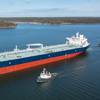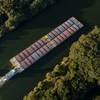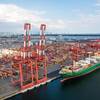Funding for the GloBallast Partnerships project, to assist developing countries in reducing the transfer of harmful aquatic organisms in ships' ballast water, has been approved by the intergovernmental Council of the Global Environment Facility (GEF), enabling the project to enter an exciting new phase.
The main objective of GloBallast Partnerships (full title: Building Partnerships to Assist Developing Countries to Reduce the Transfer of Harmful Aquatic Organisms in Ships' Ballast Water) is to assist particularly vulnerable countries and/or regions to enact legal, policy and institutional reforms to meet the objectives of the International Convention for the Control and Management of Ships' Ballast Water and Sediments (BWM convention), adopted by IMO in February 2004.
The project will be executed by IMO, in partnership with the GEF and the United Nations Development Programme (UNDP), following on from the successful Global Ballast Water Management Project (GloBallast), the first phase of which ran from March 1, 2000 to December 31, 2004, involving a three-person Program Coordination Unit (PCU), based at IMO in London, and six initial demonstration sites, located in Brazil, China, India, the Islamic Republic of Iran, South Africa and Ukraine.
Activities carried out at these sites focused on institutional strengthening and capacity building.
Funding for the preparatory phase of the GloBallast Partnerships was granted in 2005, thereby facilitating the development of the full-scale project, which is expected to be launched later in 2007. The new IMO intervention will cover 14 developing sub-regions and include 13 Lead Partnering Countries (LPCs) and over 40 Participating Countries (PCs) that have shown keen interest in participating in the project. The full-scale project proposal was prepared after an extensive consultation process with LPCs, PCs and strategic partners over the last two years, which also included mobilization of significant co-financing.
Quantitative data show that the rate of bio-invasions is continuing to increase, in many cases exponentially, and new areas are being invaded all the time. In this context, volumes of seaborne trade continue to rise and, consequently, the problem may not yet have reached its peak.
Invaders from the Sea film
The IMO-produced documentary film Invaders from the Sea won the gold award in the category of "Best United Nations Feature" at this year's "Stories from the Field", the third annual United Nations Documentary Film Festival, which took place in New York in April 2007.
The documentary, which is available on DVD from IMO's Publishing Service, shows some of the dramatic impacts of aquatic invasive species on marine ecosystems and human health. The film also features some examples of solutions to preventing the spread of invasive species in ships' ballast water, including exchange of ballast water on the high seas and new technologies that are under development, such as automatic flow-through systems to exchange ballast water continuously and methods to kill or render inactive microscopic life forms by, for example, using ozone or ultraviolet light. Different solutions may be required for different ships.
Sponsored Content
Innovative Hull Maintenance: Profitable & Green

Subscribe for
Maritime Reporter E-News
Maritime Reporter E-News is the maritime industry's largest circulation and most authoritative ENews Service, delivered to your Email five times per week













